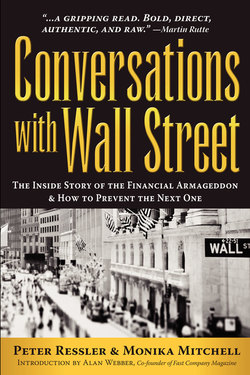Читать книгу Conversations With Wall Street - Peter Ressler - Страница 14
На сайте Литреса книга снята с продажи.
Easy Money
ОглавлениеAt the same time, I was reading in the paper about the outrageous actions of many firms in the markets. The industry recklessness was well-documented; contempt for Wall Street exploded to new levels. Additionally, there were those on Main Street who had behaved similarly: the mortgage broker in a one-room office on Main Street who had given out loans like others give out lollipops; individual investors who had bought homes with no money down and walked away without a second thought; borrowers who had “bought” homes with loans at 120% of value; the real estate agents who had worked with lenders to churn out as many poor quality deals as possible. The industry had somehow cannibalized itself. “Sign here” for a fast profit was the repeated call. Housing values will keep going up—no problem. Simple folks were caught in the frenzy of Wall Street easy money. They wanted a piece of their own get-rich-quick scheme too. If Wall Street can do it, why can’t I? Behind it all were the industry market makers whom I spoke with every day. Unlike the mortgage broker or lender, the people on the other side of the securities trade were distant from Main Street. One of the top producers in the mortgage market explained, “The human factor is too far removed from what we do.” I began to see this as a fundamental problem leading to this tragic moment in America. Main Street had emulated Wall Street; both had collaborated on a giant mortgage Ponzi scheme by exploiting the “American Dream.”
The dream was just about money in their minds, not family homes, livelihoods, or individual futures. I began to think if we as a society could develop a greater understanding that money represents human effort and energy and is not simply some inanimate thing disconnected from us, we might very well shift the system. What is a mortgage anyway? Very simply, it is thirty years of our labor. It represents somebody’s life’s work, a family home, the fruit of three decades of effort. What do we do in our homes? Eat, sleep, laugh, cry, raise children and create a life for ourselves and our loved ones. It is so much more than a paper document that is traded dozens of times. It represents each of us at the deepest level of our society. In the midst of this massive and tragic con game were ordinary folks and decent industry pros, all of whom were broadsided by the excesses of others. Housing prices plummeted and the credit markets froze, thereby affecting every consumer and every small, medium, and large business in America. And then it rippled out across the globe. No longer was this relegated to the upper levels of Wall Street and the ordinary real estate industry; now it became a cross for all of us to bear. In the fast-paced cyber-economy of the 21st century, everything we do is tied to each other directly. It was something we had failed to recognize as a society in the century before. The first time I understood this fully was on September 11, 2001. On September 15, 2008, I understood it again.
Financial reform has passed in Congress. It remains to be seen how effective this will be in averting another meltdown like the subprime mortgage crisis. Yet the financial industry is full of clever people paid to think of ways to get around laws. No matter how many reforms we enact, the thing that will save us comes more from within than without. In a society, people need laws, but they also need a moral code that determines its values. What stops most of us from murdering someone is not a law—it is a deep conviction that murder is wrong. We do not need a law to teach us that simple truth. In the global Wall Street, stretching across fifty states, small town U.S.A, the streets of London, Frankfurt, Paris, and Brussels, the cities of Europe, Asia, Australia, Africa, and Latin America, the financial markets affect modern life for billions of inhabitants. We have a duty to honor that responsibility. The moral code of the financial industry has gone off course. It has been distorted by the false belief that money is only paper to be traded or numbers on a screen to be manipulated—and not representative of human lives. We forgot ourselves in the quest for more. We forgot each other. We have been at this place before in America. We were here in the early 1800s, and again in the later part of that century. We arrived here in the Panic of 1907 and with the Crash of 1929. We repeated history once more with the Financial Crisis of 2008. With each crash, we learn something, but perhaps only to forget it when times are good. With the world connected in a way it never has been before, perhaps we can glean some lasting wisdom from our own past and present.
